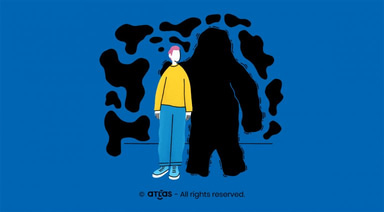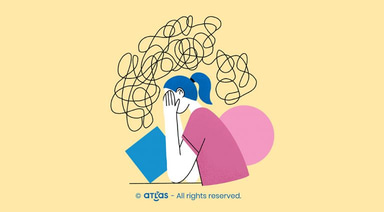Stress is a word that reaches our ears more and more often. It is impossible not to know it and not recognise it. We meet stress in everyday life and consider it responsible for many of the problems we have. But do we know what are the most common sources that generate stress?
We have challenged some of the specialists in the ATLAS community to reveal to us a top of the stress-causing factors they have encountered and to give us information on how to recognize and manage them better.
The third article in the series is written by psychologist Bogdan Pîrtoacă, the other two articles you can read here and here.
What is stress?
Stress is the natural reaction of the body’s answer to any kind of need or threat. When a hazard is perceived, real or imagined, the body’s defence enters a few milliseconds into a transformation process that bears the name of the answer to flee or fight.
The response to stress is how the body protects you, and when it works properly it helps you stay focused, energetic and alert. In emergency cases, this reaction can save your life by giving you extra power to defend yourself or push you to press the brake when driving to avoid an accident.
Stress can help you mobilize yourself to cope with challenges, such as supporting a presentation or helping you focus better on work tasks. From a certain point, it ceases to be useful and begins to cause damage to health, mood, productivity and networking with others.
Top 5 Sources of stress
We usually think of stressors as negative, such as an exhausting work schedule or an unstable relationship. However, anything that will generate great demands on your part can be stressful, such as: Entering the faculty, marrying, buying a house, or promoting it in office.
Not all stress factors are caused by external factors. Stress can be internal or self-generated. It can happen :
- when you’re overly worried about something that may or might not take place, or:
- when you have irrational or pessimistic thoughts about life.
What causes stress depends largely on how you perceive what is happening. Something that’s stressful for you, for another person, can be a thing that won’t affect her or even something she pleases. For example, while some of us are terrified to speak in front of people, others are made to live in the limelight.
The most common 5 external causes that generate stress include:
- Workplace
- Difficulties in networking
- Financial problems
- Lack of leisure and relaxation activities
- Children and family.
The most common 5 internal causes of stress are:
- Inability to accept uncertainty
- Inflexible thinking
- Negative inner dialogue
- Perfectionism
- Thinking type ‘everything or nothing’.
How can we recognize that we are not “on the right track”?
Stress can easily “infiltrate” your life. Or maybe you are familiar with it and that is why it is very important to be aware of the most commonly encountered warning signals.
On a cognitive level, you will notice problems with your memory and concentration of attention, difficulties in decision making, negativity, constant concern signal.
Emotionally: state of general unhappiness, state of agitation and anxiety, changing emotional states, irritability or anger, feelings of overwhelming, loneliness and isolation.
Behaviour symptoms: Increased or decreased appetite, difficulty sleeping, postponement or neglect of responsibilities, use of alcohol or other substances for relaxation, nerve tics.
On a physical level: headaches or bodily pain, diarrhoea or constipation, nausea, dizziness, chest pain, palpitations, decreased or loss of libido, frequent colds.
How can we effectively manage stress?
An Irish Proverb says: a good laugh and a long sleep are the best treatments in doctors ‘ books. This means that managing stress involves making lifestyle changes:
- Work in a reasonable way,
- Eat healthy,
- Practice physical activities on a regular basis,
- Sleep enough,
- In general, try to have a stable, balanced and without excesses program,
- Don’t forget your passions and schedule outdoor activities,
- Talk to your friends or family about your difficulties,
- Make new friends,
- Learn to organize your activities better,
- During work hours, set your breaks and respect them,
- Resist perfectionism and negative thinking,
- Do not try to control what cannot be controlled.
How can online therapy sessions help you?
Time is the most precious resource we have. Online meetings on the ATLAS platform save time and allow you to spend more hours with your friends, family or to relax. Sessions are video-conferencing, you can schedule them at any time. It allows you to have high-quality communication with your therapist. This is similar to your cabinet meetings.
What happens during an online therapy session?
Customers who I worked with to mitigate stress problems had either difficulty at work or in networking with a close person.
The intervention starts with an assessment of the emotional state and dysfunctional behaviours, but also with the identification of skills and strengths. Subsequently, the therapeutic objectives are set. The customer is familiar with the relationship between thoughts, emotions, and behaviours, how they interact and how they influence it. It is then learned:
- different cognitive techniques of modifying irrational thinking,
- ways of modifying behaviours,
- assertive communication techniques
- problem-solving techniques.

During a meeting, you discuss if progress has been made from the last meeting and the difficulties encountered in putting in practice the techniques learned. At the end of the hearing, a summary is made and the homework is established, and the last element of each meeting is the feedback.
Schedule now a meeting with Bogdan! It can help you better identify and manage the sources of stress you’re exposed to.



